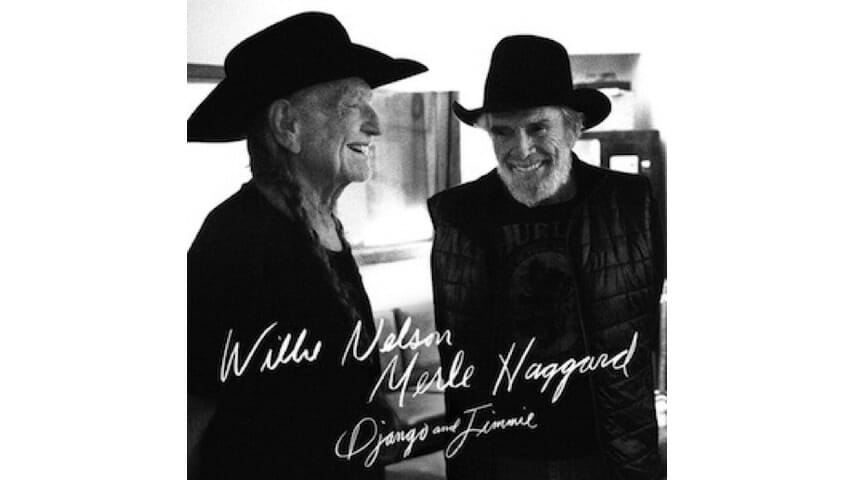Merle Haggard and Willie Nelson weathered storms—survived politics, broken hearts and rules with equal aplomb. At 78 and 82, like the best old bluesmen, they just chug on, grinding out songs and crisscrossing the highway making music.
Veracity makes Django and Jimmie a marvel, mixing novelty, pathos and classics. What emerges is a core sample of what made these men—known for country classics from “Crazy,” “Bloody Mary Morning,” “Night Life” (Nelson) to “Mama Tried,” “Okie From Muskogee” and “Think I’ll Just Stay Here and Drink” (Haggard)—endure for half a century. Beyond reprising Nelson’s “Family Bible” and Haggard’s “Swinging Doors,” they find a new depth to Bob Dylan’s “Don’t Think Twice (It’s Alright).”
Still, it’s the mariachi-horned “It’s All Goin’ To Pot,” as clever a “smoke ’em if you got ’em” midtempo track as was ever written, that started Django and Jimmie’s buzz. Social commentary meets marijuana endorsement, the song sees Haggard and Nelson savoring the truth wrapped in a joke.
On the Hawaiian-feeling hippie/groupie homage “Alice in Hulaland,” they deliver a sweet, loopy waltz. The train beat of “Missing Ol’ Johnny Cash,” with its cameo by Bobby Bare, catalogues crazy details in the Man in Black’s life from roasting hot dogs in a limo to keeping his pills in a paper bag, while marveling “lovin’ life was his greatest sin.”
If the chugging “It’s Only Money” is an easy-come, easy-go reveler, suggesting Nelson’s “Whiskey River,” Haggard’s back-in-the-pocket delivery drops it into the zone between Austin and Bakersfield. Full of rolling barrelhouse piano and Dixieland horn punctuations, it’s a funky feel-good kind of country.
But it’s the luxurious classic ballads where the elegance and eloquence reign. “Unfair Weather Friend” and “Where Dreams Come To Die” are bookends for life’s struggles, the comfort of the one who shows up and the reality that some things will not happen. Slathered in steel, stately guitar parts and the exhaled vocals that are signature for both, it makes the case for a genre being outmoded.
Perhaps “The Only Man Wilder Than Me,” though, is the signature. If the title track celebrates their influences, “Wilder” seems an encapsulation of the two legends, who determinedly made their own kind of music regardless of fashion. As Mickey Raphael’s harmonica warms up the track, Nelson etches this truth: “If he ever really cared, he’d apologize/Indifference has kept his mind free/He knows yesterday’s dead and tomorrow is blind/He’s the only man wilder than me.”
To imagine as wild or as free is hardly worth the effort. Just hearing them make the music they want is plenty.
